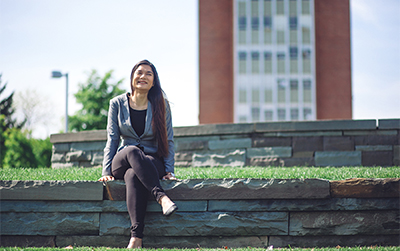
Undergrad explores Western diet’s influence
Binghamton junior Khin Oo studies how the adoption of a Western diet affects children in the island nation of Vanuatu.
“When it comes to a westernized diet, we have a lot of high-fat, high-salt, high-sugar intakes that will impact children growing up,” she says. “Obesity is the big chronic disease that we’re seeing world-wide, so studies like these help us understand at an earlier rate how it starts.”
Oo, a biomedical anthropology major, explored young girls’ weight growth in Aneityum, one of Vanuatu’s islands. According to Oo, Aneityum has seen an increase in the consumption in processed tinned meat and fish and instant ramen noodles that have come as a result of Westernization.
She analyzed girls’ macro-nutrition and body weight data (such as Body Mass Index) from the years 2007, 2011 and 2017 to understand changes in body fat. She compared girls of the same age at the three different times, focusing on children ages 6-17.
“Interestingly enough, we found that body fat has actually decreased in females,” Oo says. Macronutrient intake also increased, and their BMI became more similar to growing girls in the United States.
These findings indicate that a Western lifestyle may help increase macronutrient diversity. Oo emphasizes this is not the whole story, however, and that physical activity, economic status and education are also important factors in overall health, which may be studied in future research.
Oo, who presented her study during Binghamton Research Days, also collected data for boys during the three years. She found that body fat increased in 2011 and decreased in 2017, but due to a low sample size for nutrition data she wasn’t able to draw conclusions about why that might be.
Graduate student Kyle Gowen said Oo came up with the idea to study how a Western diet influenced weight and nutrition throughout the years. Their professor, Ralph Garruto, had already collected most of the data from Aneityum for related research.
“She’s incredible. Analyzing how modernization affects children’s growth, these are large problems to tackle,” Gowen says. “She has the mind to think about these larger problems. She knows what she’s doing and she knows what she needs to get done and when.”
Oo, a native of Myanmar who now lives in Brooklyn, plans to go to medical school. “The health system is really bad [in Myanmar],” she says. “My grandparents actually passed away from diseases that could have been prevented there, and that jump-started me into the pre-med route.”
Oo says she’s interested in Doctors without Borders, in part because of her desire to bring modern medicine to areas that need it while also being mindful of cultural differences. In the summer of 2017, she interned at a research facility in Madagascar, providing healthcare and conducting research on children’s respiratory health.
One way she learns about people and cultures is by cooking dishes from other countries. Oo, a renaissance woman of sorts, also serves as a teaching assistant for physics and an assistant at the systems science and industrial engineering department. She enjoys painting, too.
“I don’t want to just focus on one field as an undergraduate,” she says. “I’m trying to branch out, see everything I can, just intake knowledge and see where it leads me.”







